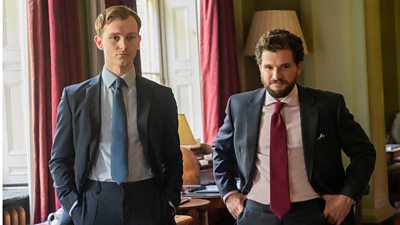
In season three, as Pierpoint looks to the future and takes a big bet on ethical investing, Yasmin (Marisa Abela), Robert (Harry Lawtey), and Eric (Ken Leung) find themselves front and centre in the splashy IPO of Lumi, a green tech energy company led by the British aristocrat Sir Henry Muck (Kit Harington), the embodiment of 鈥榦ld money鈥� privilege.
Since leaving Pierpoint, Harper (Myha鈥檒a) is eager to get back into the addictive thrill of finance and finds an unlikely partner in FutureDawn portfolio manager Petra Koenig (Sarah Goldberg).
Interview with Kit Harington
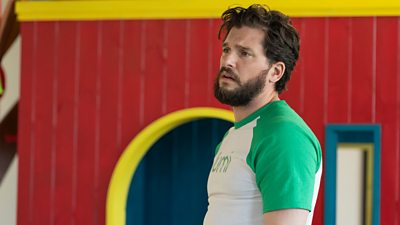
Sir Henry Muck
Who is Henry Muck and how does he come into the Industry story?
Henry is a rather privileged young man from the English aristocracy who comes into the story as the CEO of a green energy startup called Lumi. Pierpoint and particularly Harry鈥檚 character Robert, are helping Henry launch Lumi as an IPO. Henry has all the best intentions, and thinks he is doing the right and the good thing for the planet. As well as for himself and for everybody else. But he's maybe not the most astute businessman鈥�
What is Henry and Robert鈥檚 relationship?
I've always loved what Harry (Lawtey) does in this show and I think that Rob and Henry were the natural pairing to put together because Robert has come from a low-income background and has worked his way up into this world 鈥� he's a fish out of water in many ways 鈥� whereas Henry feels like he's lowered himself to come into this world. He's dealing with money, which he doesn鈥檛 have to do normally, and so they meet coming from completely opposite ends of the spectrum. I remember doing research for a different show a few years ago, reading about how the upper class in the UK and the working class both get on 鈥� they are united in their hatred of the middle class. I think there's something of that in Robert and Henry: they come from opposite ends of the class spectrum, but they kind of like each other because they both f***ing hate the middle class!
How did you come to join Industry?
After a few years of not having a proper, season-long arc as a character on a TV show I was like, 鈥業 miss that. I want to do that again.鈥� My agent came back to me and said, 鈥楧o you watch industry?鈥� I did. I love the show. And they said, 鈥楳ickey and Kon have an idea for a character that might fit you.鈥� And so, I met with them. They told me about Henry Muck and I went, 鈥業 know that guy. I've met that guy.鈥� And being a fan of the show and knowing them to be good writers and them luckily liking what I do, it all came together.
What was it you liked about the show as a viewer?
It had this energy to it and tonally it felt very different to anything I had seen before. I think it comes from the fact that they hired a lot of young actors straight from drama school 鈥� and they themselves [Mickey Down and Konrad Kay] were creators who were pretty green. I love the music they use; I love the way they film it. I love that it doesn't allow you to stop 鈥� it just pummels you with these incredibly complex words and sentences that you have no idea what they mean鈥� and it just requires you to keep up. All of those things made me think it was incredibly original.
Interview with Marisa Abela
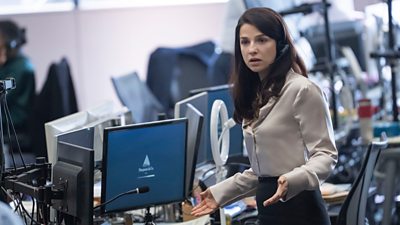
Yasmin Kara-Hanani
Where do we find Yasmin at the beginning of the third season of Industry?
We find Yasmin in a pretty fraught state at the beginning of season three. She鈥檚 being hounded by the tabloids because her father is on the run and she is being painted as this privileged heiress, shouldering a lot of the blame for her father's woes. She's in a pretty intense place this season. I think she has to compartmentalise in an incredibly intense way as she's being sort of shamed in a public forum. For someone like Yasmin the way that she presents herself to the world is almost the most important thing to her so this is a living nightmare. She's trying to throw herself into work, both emotionally because she needs an escape but also because she doesn't have her father around anymore to help her through life. She's sort of on her own now, trying to forge a path for herself, but in a very precarious, emotional situation.
How has your character evolved since we first met them in season one?
Yasmin鈥檚 sense of self has matured since season one. For her, the girl that was getting salads for everyone does not exist anymore. She really has evolved into a very different young woman. I think that she is stronger. I don't think that season one Yasmin would have been able to deal with what season three Yasmin deals with, yet at the end of this season we see what Yasmin holds most valuable, when it really boils down to it, which I think does chime back to the girl we saw in season one.
Where are the relationships between the original grads now?
Yasmin is living with both Robert and Harper this season. I would say they鈥檙e the closest they've been since the middle of season one as a threesome. Robert is offering her a lot of kindness and safety 鈥� she needs a place to live and he's given her one. Harper is her confidante again, the place that she feels that she can be most honest, because Harper is privy to what's been going on with her father in a way that other people aren't. You're also seeing her dealing with Eric [Ken Leung] for the first time ever, really this season. So, there are definitely new dynamics at play for Yasmin in season three.
How has Industry as a whole evolved since the first season?
I would say that Industry still focuses on the same world, the world of finance, where cash is king. That defines every character that is placed in that world, but it's a bigger show now 鈥� the world has grown, it doesn鈥檛 need to be set in the middle of a bank anymore.
Interview with Myha鈥檒a

Harper Stern
Where do we find Harper at the beginning of the third season of Industry?
Harper is working at FutureDawn [the ethical investment fund] as Anna Gearing鈥檚 [Elena Saurel] assistant. This is the job that's kept her in London, bless her heart, and Anna鈥檚 really taken a chance on her. But it means that now she is at the bottom of the totem pole. She is not exercising her skills, she holds no influence whatsoever and she's sort of just keeping her head down so that she doesn't get deported, because she doesn't want to go home. She's pretty depressed but she鈥檚 handling it, obviously and she's grateful to still be in London. She's drinking too much and going out and coming in hungover and she's not very good at her job 鈥� she's not good at keeping a diary!
How does she bounce back?
She sees an opportunity in Petra [Sarah Goldberg], who is a trader in Anna Gearing鈥檚 office. Harper piques her interest 鈥� she sees that this is a person she can intellectually engage with. For Harper, Petra is an out. She convinces her to help get her out of FutureDawn and into a place where she can start trading again.
How has your character evolved since we first met them in season one?
The biggest change in Harper is her confidence. When we meet her in season one, episode one, although outwardly she had this really hard exterior, inside she鈥檚 insecure. She has impostor syndrome, completely doubting whether or not she can have a place at Pierpoint and if she's going to be able to hack it. By the time we meet her in season three, although she's at her lowest at the start, she's been around the block. She's tried her hand at moving in this business, and it's worked. She鈥檚 got relationships, she knows inside that 鈥業 am successful and smart at this. I'm clever, I can make my way here.鈥� The thing that got in her way was nothing to do with whether or not she was capable of doing the job. So, she brings a level of confidence in this third season that we haven't seen from her before 鈥� and she鈥檚 totally earned it.
Where are the relationships between the original grads now?
There's an event that happens that bonds Yasmin and Harper eternally 鈥� trauma bonding, maybe. And I think it is the grounding thing that this relationship has always needed. We know now that these two people love each other, even if they hate each other just as much! And then when business takes the forefront for Harper and Yasmin ends up being collateral, it feels like the trust there, the familial bond that's been created is broken, and it leaves them at odds in a way that I believe to be irreparable.
How has Industry as a whole evolved since the first season?
I think our biggest explosion as a show has absolutely happened in this season. Every season we've added new faces and new conflicts outside of the bank, but in the third season it's the first time Harper, one of the main eyes into the show, is not in the bank at all, so we get to experience, for the first time, who Harper really is outside of Pierpoint. Once we're outside of Pierpoint, we then get to spend a little more time with all of these characters and their relationships outside of Pierpoint. It informs you more who they are and why they are like that. So the whole show has expanded 鈥� Mickey and Konrad are geniuses. They can write anything, and I'm obsessed with them!
Interview with Harry Lawtey

Robert Spearing
What is Henry and Robert鈥檚 relationship?
In season three it's fair to say that Robert is finally claiming some sort of autonomy, professionally. He's been given more responsibilities, gained more trust, and it leads to him being Pierpoint鈥檚 sort of point man working hand in hand with Henry [Kit Harington] to value and launch this company at IPO. But over the course of the season, it becomes unclear whether that trust from both Pierpoint and Henry towards Robert is genuine or not, or whether he's being used as a bit of a scapegoat.
How did you find working with Kit?
I absolutely loved it! First and foremost, to have someone who has such an established, impressive career be so invested in the show and really want to be a part of what we were making was really validating and encouraging for us, we who had been there since the start and have kind of grown up with it. And Kit is just such a fantastic actor, such a brilliant guy; he has such a fun, positive energy. We were constantly joking throughout that both on and off screen we developed a bit of a bromance!
How has Industry changed as a show over three season?
The big difference is a tonal one. I think that now, Mickey and Konrad are prepared to make big swings and adapt the style of the show, to something that's a bit more out there. The show has always been hyper real, but now there are moments which are a bit more abstract and a bit more lyrical. They're having fun with it and that's exciting to be a part of. We all recognise on the cast that this time there are a few beats and moments that aren't typically 鈥業ndustry,鈥� so to speak. It鈥檚 exciting to feel as though you're part of a machine that's changing.
Interview with Sagar Radia
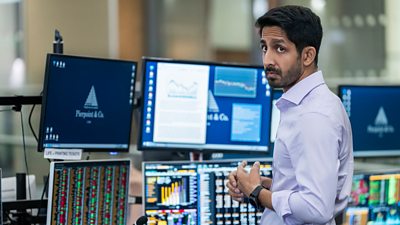
Rishi Ramdani
What is Rishi鈥檚 story in season three?
It's an interesting one, because when most people tune in, they鈥檒l be assuming they're going to see the same Rishi 鈥� work hard, play hard, taking the mick out of everyone on the team. But actually, once we delve into a couple of episodes, we realise there's something much deeper going on here than we've seen in the first couple of seasons. He is struggling at work and struggling at home in a way that he's trying to mask 鈥� very unsuccessfully. And then we hit episode four and we really delve into what's going on there in terms of the hole he's got himself in to, this huge amount of debt. For Rishi it's a bit of a crazy season in terms of we see him far more unhinged than we've ever seen him before. He's changed as well. He's married; he's got a baby now, so it's also him assessing the type of man he wants to be and whether those changes in his life have affected him in a good way or a bad way. That's what we come to find out during the season.
How has your character changed over the season to date?
I don't think Rishi is miles away from who he was when we first met him. I think what it is, is the camera鈥檚 just gone further back, so we know more about him. When I first landed the role of Rishi and was going, 鈥極kay, who is this guy?鈥� it was more about energy. It was more about an attitude, trying to find that and let that live. Then I think what happens is that you just find yourself more comfortable with it as you carry on. And then thankfully, the boys [Mickey Down and Konrad Kay, creators] wrote a little bit more, and then they wrote a little bit more and what ends up happening is I'm learning about the character the same way the audience is learning about the character. Season three, episode four just blows that wide open. I'm learning more about his home life and that dynamic with his wife and their family and how he is coping as a father and what that looks like. I'm on that journey with you guys!
What does Industry have to say about diversity in the workplace?
I was having this conversation recently with one of the people who inspired the character of Rishi, talking about the presence of people of South Asian descent in the workplace in finance, him being one of them, obviously, Rishi being another. And the presence of the South Asian diaspora in finance, in London especially, is massive. What Mickey and Konrad did so brilliantly was they put in a character like Rishi because they know it exists. He鈥檚 someone who looks like me but he comes from a position of strength. He comes with this alpha dog mentality, this no BS attitude. I don't know about you guys, but I've never seen that on TV. That representation in the show is so important. I feel so humbled and lucky when people come up to me and say you're the representation that we've needed in this industry, meaning TV.
Interview with Ken Leung
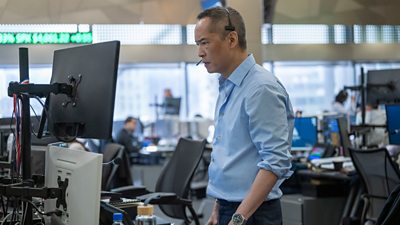
Eric Tao
What is Eric's story in season three?
Well, at the end of season two, as we know, Eric fired Harper. Season three, some time has passed 鈥� maybe like eight months or something 鈥� and Pierpoint is making a change. It's trying to position itself as the go-to 鈥楪reen Bank,鈥� and it's turned to what we're calling ethical investing. Eric has become the pilot of that pivot. We don't see this, but presumably he spent a lot of time in the US to start that off. That has had an adverse effect on his marriage and his personal life. So when season three starts, at the same time that he's rising at Pierpoint, his personal life is in the toilet. And he's also at this place where he's getting old, you know, in a young man's game. One of his lines is, 鈥業'm saying yes to things that I used to say no to.鈥� Everything's new for him, and at the same time, the clock is ticking. That brings up certain insecurities in him too and we see how that plays out.
How has your character changed over the season to date?
Eric started in control with both feet planted on the ground, arrogant, in an 鈥業 own this place鈥� kind of space and he rides that wave throughout. But always he's had in the background the stability of the life at home that we don't see. What we really get in three is that that part has collapsed. I started off in this show in a kind of 鈥榞rab the role by its horns鈥� place, particularly because finance is just a completely foreign world to me. Once I did that, I was in a very stable, confident place but as we鈥檝e gone on, I've been looking for holes in that. Because that's the fun part: when your feet are planted, the fun part becomes looking for things that throw you off balance, so I've been doing that.
Do you think that Industry has particular things to say about the world?
I think it's reflective of what's going on in the world. From season two, which was filmed during the height of COVID, our storyline became about the healthcare space. And now this season, it's in the ESG [environmental, social, and governance] space. So I don't know that it has something to say, as much as it's reflecting off real things that are happening in the world. In that sense, it's political.
Interview with Creators and Showrunners Mickey Down and Konrad Kay
What story are you telling in the third season of Industry?
Konrad: On a very rudimentary level, we wanted to tell the story of a green energy IPO (Inititial Public Offering) that goes wrong. The show is a business show as well as a workplace show, and the idea of ethical investing has been in the news headlines a lot. The show has always taken a bit of a cynical view about what people say their motivations are versus what they really are. We like it to function as a bit of a tongue in cheek, straight faced satire sometimes. We thought this story was perfect for that kind of exploration. Also, Mickey and I were very cognisant of the fact that in the first few seasons we didn鈥檛 really look at the real world consequences of people's ambition. The idea of a company failing and then being bailed out is obviously something people know all too well by now. So, we thought this would be a more universal story.
Mickey: With that in mind, we wanted to bring new characters into it as well. We thought who were the most interesting people at the centre of this new sphere we were trying to explore? What does a tech founder look like in 2024? In the UK, it looks very, very different to a tech founder in the US. We thought that Henry [played by Kit Harington] was a great reflection of what that sort of person would look like. Your archetypal tech founders are your Adam Neumann (former CEO of WeWork) or Steve Jobs figures who want to change the world. Whereas the reality, especially in the UK, is that they are generally massively well-educated, Oxford, Harvard, MBA; usually quite privileged already and given a lot of leeway or rope to hang themselves with 鈥� because there are never any consequences for that kind of person. What does it look like when that person is in charge of something which eventually has to be bailed out to the tune of billions of pounds with lots of real world ramifications? So we thought, okay, that's an interesting character to be at the centre of it all. And that鈥檚 Henry.
Then we wanted to have more interaction between our core characters. The first season was about a very bottom-up look at finance, but as we鈥檝e gone on the characters have more power, they're older, they can move through rooms that they weren't able to move through before. So now we're able to explore some of the more elite people in these parts of society than we could in season one.
Which characters were you keen to give more screentime and why?
Mickey: Eric and Rishi, always! Basically Ken [Leung] who plays Eric鈥e just always think we鈥檙e not using him enough. He鈥檚 such a phenomenal actor. Sagar, who plays Rishi 鈥� he started out as a slightly secondary character who said funny things on the trading floor. Season two, we gave him a lot more to do and he was so good at it that this time round we said, 鈥極kay, you're getting your own episode.鈥� And he was pretty daunted by it, I think. But he is phenomenal in that episode (four).
Konrad: And then there are all the new characters as well: Sarah Goldberg who plays Petra and of course Kit [Harington] are both amazing actors who we鈥檝e loved writing for. They鈥檝e both done that thing of bringing a lot of humour to characters that on the page could be considered charmless. I think the great thing is you could break away and tell a whole episode about any of them for an hour and it would be strong. It's down to the actors 鈥攖here's something about casting small parts well which is just the lifeblood of a successful show.
You direct some episodes as well as write the show. What were you trying to achieve?
Konrad: The north star was intensity. People talk about the show being intense in season one and two 鈥� we took that as a challenge. One of the things that me and Mickey talked about was what does an episode of Industry look like if it all felt like the last 10 minutes of episode two of season two when Harper was doing that trade? And can we sustain that for an hour? We love that feeling of constriction on the viewer: when people say, 鈥業t makes us feel a bit nauseous,鈥� we鈥檙e like, 鈥極kay, that's great.鈥� That's the show functioning on an almost visceral level, which means that people might even put their phones down when they watch it. And that would be the highest praise.
Mickey: That intensity was earned, as well. Season one was about the small moments of working on a trading floor, like, what does it look like if you f*** up a salad order or you say the wrong thing to your boss? Season three is about what does it look like if you鈥檙e doing something that has a huge, existential effect on the country. That鈥檚 the joy of doing a workplace drama where people actually grow up within it. We get to actually deal with things that have higher stakes as it goes on.